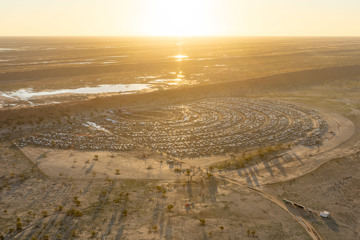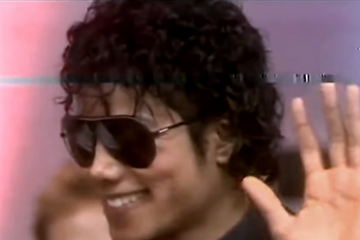Move Over Wentworth, Orange Is The New Black Is Back
Behind Bars with 'Crazy Eyes' And Aus Actor Yael Stone
There have been exceptions to the stereotypical “women behind bars” films and TV shows. The much-loved Australian TV series, Prisoner, managed to add a touch of gritty realism to its behind-bars drama, and the 21st century remake, Wentworth, ups the grit and realism even further. Blazing a trail all its own, however, is the award-winning, critically-acclaimed US series Orange Is The New Black.
Adapted by writer, director and producer Jenji Kohan (of Weeds fame) from the memoir by real-life ex-con Piper Kerman, Orange Is The New Black initially focused on Piper Chapman (Taylor Schilling), convicted of carrying drug money for her ex-girlfriend and sentenced to 15 months in Litchfield Penitentiary.
But the series quickly broadened its view to take in Litchfield’s wide variety of inmates, their fascinating backgrounds and the complex web of relationships they’d formed while incarcerated. Two fan favourites are Lorna Morello, played by Australian actor Yael Stone, and Suzanne ‘Crazy Eyes’ Warren, played by Uzo Aduba, and the two actors were recently in Australia to promote the third season of Orange Is The New Black, premiering on streaming service Netflix 12 June.
"It’s kind of a delicious way to explore a lifetime of experience"
The camaraderie of the OITNB cast is well-documented – paparazzi shots or Instagram galleries frequently show the actors in each other’s company – and it was well-evident that Stone and Aduba revel in each other’s company. Both had primarily theatre backgrounds before landing their roles on the show, but were immediately attracted to Kohan’s rich scripting and flair for characterisation.
Don't miss a beat with our FREE daily newsletter
“I remember reading the script the summer of 2012 and in a time when I was auditioning for television pilots and movies and a bunch of other stuff it was one of two scripts that really stood out,” recalls Aduba.
“I remember reading the Orange Is The New Black pilot and feeling like everybody on the page came alive – they felt so vivid, my brain could see them. Not their faces necessarily – it wasn’t like I could see the face of [co-star] Natasha Lyonne...”
“That would be amazing!” exclaims Stone.
“That would be amazing!” laughs Aduba. “But I could see [the character of] Nicky Nichols so vividly. I could see Lorna Morello. I could see Tastee. I could see Piper. I knew who these women were because their stories radiated through. My character doesn’t come in until episode two, and I remember reading episode two, getting a quarter of the way through and realising, ‘Wow, we’re not just telling a story about women in prison; we’re telling the story of these people’s lives. It’s about life outside the frame of the environment they are currently in.’
“That impacted on me because I realised Jenji was using Litchfield as a platform or a forum to tell these amazingly rich stories. They’re people before they’re inmates. We’re talking about mothers, sisters, wives, friends, neighbours. And it was amazing to me, that she had been able to accomplish that.”
Did Stone feel much the same way on first reading the script? “All my thoughts are exactly the same as Uzo’s,” she says. “It’s really weird.”
“Except she did see Natasha’s face,” smiled Aduba.
“I was certainly struck by the complexity of the writing, and also by the humour – there’s that fine balance of comedy and tragedy that Jenji does so well,” Stone explains. “It’s one of my favourite things; it’s kind of a delicious way to explore a lifetime of experience. You look at the context, that forum that Uzo is talking about, and what that invites is a lot of different kinds of people who have committed different kinds of crimes but more importantly have different lives being put in a pressure-cooker kind of situation.
"I love these women so much – I literally cannot say it enough"
“Some people say that to really understand a society, you look at how people treat their prisoners, and it’s exciting for me to look at that corner of society that doesn’t get a lot of attention. I think the show makes a huge comment on society both in America and around the world. It’s especially relevant to the US because of its enormous prison population but Australia isn’t that far behind, and this third season really sheds a lot of light on the money-making involved in incarceration – Jenji is incredibly intelligent; she has a global vision.”
The way Aduba views it, Kohan is using something of a Shakespearean tactic in Orange Is The New Black.
“It’s always the fool who seems to bring to light the realities of the world around them,” she reminds us. “Jenji is no exception to that – she highlights crises in a very palatable way. Or at least stokes the conversation. What’s really interesting in what she has done is that she’s taken some of the deliciousness out of voyeurism – you look at closed societies like prisons, and we don’t really know what’s going on behind those walls, so it’s really exciting to imagine lives for these people. By going behind the walls of Litchfield, she has humanised these people. It makes it harder for us a society to put these people away and forget about them.”
Season two of Orange Is The New Black revealed new facets of both Morello and Suzanne (Aduba never refers to her character by the ‘Crazy Eyes’ nickname), and further revelations and insights lie ahead in the upcoming season. Thoughtfully, though, both are keen to avoid divulging spoilers.
“For Lorna... Well, how I do say this without ruining anything?” says Stone.
“Carefully,” replies Aduba.
“There are some journeys to take, some difficult growth spurts, and some different ways of being in the world,” Stone begins. “I really hope people identify with Lorna’s journey – I love her and feel protective of her as a character. In a lot of ways, we’re going deeper into all these women.”
"I come from a world where no one person can make a show great, it takes the work of every single person"
“I think for Suzanne, Jenji is playing with this idea of faith this season and what that word can mean to these women and the world in which they live,” adds Aduba. “That word isn’t restricted to religion – it can cover so many bases. And for a character like Suzanne in the first two seasons, we’ve seen her put her faith in other people. She’s been an idol-worshipper. And it will be interesting to see what she chooses to put her faith in now, whether it’s herself or someone else.”
Regardless of the developments onscreen, it seems likely the process of creating Orange Is The New Black will be an enriching and fulfilling one for all involved, if Aduba’s obvious happiness is anything to go by.
“The writing is so alive and rich,” she says. “And my second favourite aspect after the writing is the ensemble cast experience – I come from a world where no one person can make a show great, it takes the work of every single person on that stage, and Orange is no exception.
“Everyone on our show works so hard – they’re committed to the work and really committed to each other. It sounds cheesy to say it but it makes going to work easy because you want to be with these people. I want to work as hard as I can for them in their scene because they’ve worked so hard for me in mine. I love these women so much – I literally cannot say it enough.”







